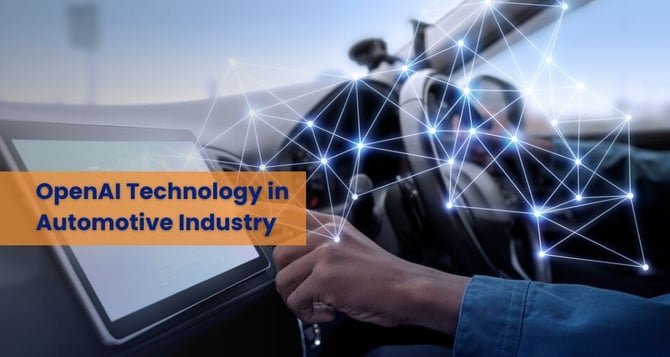Automotive AI: Elevating Vehicles with the Power of OpenAI Models
Discover how OpenAI's language models, integrated with Node.js, revolutionize cars, enabling natural interactions for navigation, entertainment, and safety, ensuring user-centric, intelligent vehicles with a focus on safety and real-time responsiveness.

The automotive industry is experiencing a revolutionary transformation with the infusion of Artificial Intelligence (AI). OpenAI's advanced language models, renowned for their natural language understanding, are playing a pivotal role in enhancing vehicles' capabilities.
This article explores the impact of OpenAI in the automotive sector, delving into the principles behind it and providing detailed technical implementations using Node.js.
The Evolution of Automotive AI
As vehicles become more than just a means of transportation, the integration of AI technologies is reshaping the automotive landscape.
OpenAI's language models are not only advancing communication but also enabling intelligent interactions within vehicles, paving the way for enhanced safety, efficiency, and user experiences.
Technical Implementation: Integrating OpenAI into Automotive Systems with Node.js
Let's dive into the technical aspects of integrating OpenAI into automotive applications. For this example, we'll focus on creating an AI-powered in-car assistant for natural language interactions.
Node.js Implementation
1. Set Up Your Development Environment
Begin by setting up your Node.js development environment and installing the required packages.
2. Create an Express Server for In-Car Assistant
Set up an Express.js server to handle natural language queries within the vehicle using OpenAI.
3. Run Your App
Run your Node.js server using the following command:
Your in-car assistant system should now be accessible at `http://localhost:3000/in-car-assistant` or the specified port.
Applications of OpenAI in Automotive
1. Natural Language Commands: Users can interact with their vehicles using natural language, issuing commands for navigation, entertainment, and more.
2. Smart Navigation Systems: AI-powered navigation systems can provide real-time, context-aware route suggestions based on user preferences and traffic conditions.
3. Driver Monitoring: OpenAI models can analyze driver queries and provide assistance while monitoring the driver's state for safety purposes.
4. Voice-Activated Controls: Voice-activated controls powered by OpenAI enable a hands-free, safer driving experience.
Considerations and Best Practices
1. Safety First: Prioritize safety when implementing AI features in vehicles, ensuring that AI interactions do not distract or compromise the driver's attention.
2. Privacy and Security: Implement robust measures to protect user data and ensure that AI interactions adhere to privacy standards.
3. Localized Language Understanding: Fine-tune language models for localized accents and dialects to enhance the accuracy of natural language interactions.
4. Real-time Responsiveness: Optimize AI models for real-time responsiveness to provide seamless interactions within the vehicle.
5. OTA Updates: Implement over-the-air (OTA) updates for AI models to ensure continuous improvement and feature enhancements.
Conclusion
The combination of OpenAI language models and automotive technology marks a significant stride toward creating intelligent, user-centric vehicles.
Empower Your Innovation Journey with AI
Drive rapid innovation and transformation with our accelerated AI solutions.
By integrating OpenAI into automotive systems, developers can elevate the in-car experience, making vehicles not just modes of transportation but intelligent companions.
The fusion of Node.js, OpenAI, and automotive AI technologies propels us towards a future where vehicles understand and respond to us in the most natural way possible, enhancing safety, convenience, and overall driving satisfaction.


%201-1.webp?width=148&height=74&name=our%20work%20(2)%201-1.webp)


.png?width=344&height=101&name=Mask%20group%20(5).png)








.png?width=352&name=microsofts-recall-feature%20(12).png)







